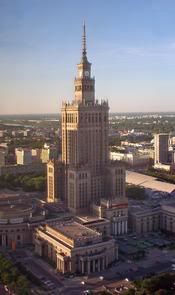Is Donald Tusk a flip-flopper?
PiS presidential candidate Lech Kaczyński has accused PO hopeful Donald Tusk of flip-flopping, after he said that it would be dangerous for one party to hold both the Prime Ministership and the Presidency.
"I have a question for the Polish people" Tusk said today. "Will one party rule Poland?... I think that's dangerous for Poland." (Polish link)
Later, at a party gathering, Lech Kaczyński accused Tusk of flip flopping, saying that prior to last month's parliamentary elections, Tusk had suggested that Poland would be strongest under one party - his own.
"Mr. Tusk very quickly changes his mind," he said.














3 Comments:
Has Karl Rove started working for Law and Justice?
Yes, I saw it, though I found it hard to disagree with their criticisms. Poland is getting better every year, but we ought to expect better.
Thanks for the compliment. Believe it or not this blog has at least 8 or 9 regular readers, and I do my best to "keep it real" for them - although, of course, what interests me comes first ;-). But if WS is "informative" (entertaining is my next goal), then it's fulfilling at least part of its mission. I hope all my readers know more about Poland as a result of this blog - I certainly do.
I'm glad that your resident Polish citizen will be fulfilling their civic duty (pun intended). I'm also sure that the turnout will be much higher - just by anecdotal evidence people seem geared up to vote. What worries me is in past weeks it seemed the enthusiasm who wanted to keep Lech out of office, this week, all the enthusiasm seems with those who want to get him in.
Kaczyński is far more charasmatic than Tusk - and the coalition negotiation nonsense (I'll post something soon) is dragging on PO. It's a bit scary.
The Economist (subscription required):
Can the eagle soar?
FROM afar, the Polish eagle is an impressive sight: a strong ally to its western friends, particularly America, and an inspiration to its eastern neighbours in places like Ukraine where economies are sagging and democracy wobbly. The media, from serious magazines to zingy tabloids, are truly eagle-eyed, and the envy of other post-communist countries. The eagle is brainy too: since the collapse of communism in 1989, the number of students has risen fivefold, to 2m; never before have Poles been so well educated. In short, Poland has never been so democratic, so secure and so prosperous.
Yet from close up, the Polish eagle looks tatty, tired and tied up in red tape. The centre-right parties, the populist Law and Justice and the free-market Civic Platform, that won last Sunday's election face a huge task if they are to spruce Poland up and unleash its full potential.
The big point is that, for all Poland's successes, other former captive nations are doing even better. Most beat Poland's annual growth rate, which is 2.8% and slowing. Some, such as the Baltic states, are growing three times as fast. That is partly due to foreign investment—a contest in which Poland has been falling behind. Investor-friendly Slovakia has done much better in winning big auto plants. But it is true in other bits of life too: Estonia, for example, is streets ahead in making the state administration lean and business-friendly. Although individual Polish firms and their workers are still highly competitive, their country, increasingly, is not.
Part of the problem is that the outgoing government, run mainly by ex-communists, was bad at both raising money and spending it. The tax system is complicated, riddled with exemptions and pitfalls, and tough on the most productive (the top marginal rate of income tax, widely evaded, is 50%). Big social charges levied on salaries make it expensive to create jobs—to put the equivalent of $100 in cash in a worker's pocket, an employer must pay well over $200—and unemployment is 18%.
To match that, government spending is poorly targeted and wastefully administered. Politically influential groups, such as miners, have been given hugely expensive early retirement deals. Officials drive shiny new cars to their shiny new offices. But inside, the wheels of state are rusty.
One result is that Polish public finances are in a mess. Including debts to private pension funds, the budget deficit is 6.8% of GDP. The debt-to-GDP ratio is 53%, perilously close to the constitutional limit of 55%. Once that is exceeded, drastic mandatory spending cuts and tax rises kick in. To make up for loose fiscal policy, monetary policy is tough: real interest rates, at 5.5%, are three times the rate of inflation.
That adds to the costs borne by Poland's businesses. So does the bad infrastructure. Most Polish main roads (and many Polish drivers) are dangerous by developed-world standards. Only 3% of main roads meet EU rules; Poland's motorway density (kilometres per 1,000 square kilometres) is one-sixth of other central European countries'. Road fatalities, at around 5,500 a year, are about the same as in Spain—despite a much lower level of car use and ownership. That throttles the movement of goods and people: a journey that in a western country would be an uneventful 90 minutes is a hair-raising three hours plus, dodging horsedrawn carts and potholes on narrow, twisting roads.
That, at least, should be easy to fix—but for the Polish bureaucratic culture of quarrel and delay. Generous EU aid is transforming roads, bridges and the like in other new member states. But in Poland the process is painfully slow. “To build a big new road you need to get agreement from the different bits of local government involved, and from the ministry,” explains a lawyer familiar with the process. “Only when they have got everything signed and sealed do you get the EU money. And all too often they just squabble.”
Comfy cartels and dotty rules
Past governments have also been very weak in encouraging the intensified competition that raises standards and creates jobs. Though the first Polish post-communist government invented the idea of “shock therapy”, the results were so bruising that Poles have been shy of radical economic change ever since. The result has been an encrustation of crony-led cartels, particularly in big formerly state-owned industries. Telecoms services are, on average, twice as expensive in Poland as in competition-loving Estonia.
That keeps Poland poor in one way. The endless petty burdens on business—a lethal combination of badly-drafted rules and badly-run bureaucracy—destroy jobs and wealth in another. Take, for example, the rules about holidays. It is reasonable, perhaps, for the state to say how many days holiday workers must receive each year. But Poland goes further, with a paternalistic rule that at least ten working days must be taken together. That stops flinty-hearted employers parcelling out days off in inconvenient dribs and drabs: all employees get an uninterrupted two-week break. But what if they don't want it?
At PMR, a business-information company in Cracow, staff asked their bosses not to implement this rule; they wanted to be able to take their holiday as it suited them. The company agreed, and even managed to obtain a letter from the labour inspectorate giving broad agreement. But the company's lawyers gave warning that this would be no defence in law. By allowing employees to do as they wanted, the company risked a 5,000 zloty ($1,500) fine.
That kind of thinking stems from opposition trade unionism in the communist era. In a planned economy (which typically put workers' interests last) fighting for every possible bureaucratic bastion for workers' rights was rational. When communism fell, the victorious trade unionists of Solidarity rewrote the lawbooks, giving Polish workers detailed, prescriptive legal protection, of a kind that now looks pointless and out of date.
In practice, with a bit of nerve, time and ingenuity, many rules can be dodged. A firm must by law have a physical (not electronic) file on every worker. Another Cracow technology company tracks its employees' activity using modern software, but keeps a paper-based system recording an entirely bogus reality where everyone arrives at 0800 and leaves at 1600.
The real routine—enthusiastically accepted by the well-paid staff—breaks both daily and weekly statutory limits on hours worked. But that's not the point. The harried manager explains, “When respectable executives in respectable companies are forced by lunatic legislation to break the law because it is impossible to run the company legally, they have to focus on issues that have nothing do to with competitiveness or adding value. It is extremely demotivating. Plus respect for politicians and administration crumbles and ‘thin end of the wedge' issues arise—if we are breaking some laws, where do we stop?”
The most conspicuous weakness of all is in the judicial system, which, according to the American Chamber of Commerce in Warsaw, is “grossly inefficient”. Resolving a lawsuit about a contract takes, it reckons, an average of 92 months. The law and the system that enforces it go to great lengths to protect debtors, but care little for creditors. That thinking may have a spurious air of fairness about it, but it imposes real costs for businesses, which in many cases can choose countries where the legal environment is more friendly. There are other changes needed too: judges are underqualified and ill-trained and work in archaic offices; courts are underequipped and burdened with jobs, such as running property registers, that they do badly.
Diagnose, prescribe, treat
These are all common problems in the post-communist world. The odd thing about Poland is that a country bursting with oomph and ambition, and with some highly intelligent politicians, has been so bad at dealing with them. Polish politics over the past 15 years has been a bewildering, and mostly depressing, cavalcade of short-lived governments and short-term fixes. Rather than get on with the nitty-gritty of running Poland better, politicians have preferred to indulge in rows about the past.
It is easy to see why. Anti-communist Poles find it deeply frustrating that the hated relics of the totalitarian era have not only escaped prosecution, but in many cases have managed to turn old commie connections into new capitalist wealth. Why should honest patriotic Poles be poor, when crooked treacherous collaborators are rich?
A second great cause of grievance is the loosely sealed files of the communist-era secret police. Unpleasant surprises from these drip out piecemeal. One politician recently discovered, just before his sister's wedding, that her much-loved godfather had been spying on the family for many years. “What am I supposed to do” he asks. “Tell her, and ruin her wedding, or allow this bastard to come as if nothing had happened?” The demand to open the archives once and for all was one of the most popular parts of the election programme of Law and Justice. It talks of creating a “Fourth Republic”, to draw a line under the tainted “Third” republic that dates from the collapse (but not eradication) of communist Poland in 1989.
There are gripes on the other side too. Those who did well under the communist regime resent the arrogance and self-righteousness of their adversaries. Rather like the French resistance, they argue, the valiant seem a lot more numerous since victory. And why should those people who made money in the early years of post-communism be penalised for having the connections and nerve to turn a profit. Surely that's what capitalism is all about?
These arguments have raged for 15 years. Now they are ending, thanks to the near-collapse of the main ex-communist party, the Democratic Left Alliance. It reached its high point under the two-term presidency of Alexander Kwasniewski, a suave, savvy politician with a background in Poland's communist-era youth movement. He gained increasing, if grudging, cross-party respect at home, and enthusiastic praise abroad, for his statesmanlike ways—helping broker the deal that changed regimes in Ukraine last year was a particular triumph.
But Mr Kwasniewski is in his last few weeks as president: Poland will elect a new head of state on October 9th, with a run-off two weeks later. That will be a contest between Donald Tusk from Civic Platform, and Lech Kaczynski from Law and Justice. The ex-communist candidate, the smooth-talking but thin-skinned Wlodzimierz Cimoszewicz, was entangled in a corruption scandal and had to withdraw from the race in September. That set the scene for last weekend's parliamentary elections in which the ex-communists were trounced, gaining only 11% of the vote, compared to 41% in 2001.
Internecine war
In the long term, the near-death of the ex-communists is excellent news. It clears the way for a modern centre-left party, unburdened by the baggage of totalitarianism. And it means that centre-right politicians no longer have the luxury of bashing an easy target. In the short term, however, it has prompted the anti-communist parties to bash each other.
The final weeks of the election campaign were a dismaying experience for reform-minded Poles. Law and Justice launched a fierce attack on its rival, Civic Platform, caricaturing it as a party that stood for the interests of wealthy businessmen. That shrivelled Civic Platform's poll rating, once nearly double that of Law and Justice. When the votes were counted, Law and Justice was ahead, by 27% to 24%.
That was not the expected result. Civic Platform's lead had seemed so unassailable that fans had started calling its candidate, Jan Rokita, “Mr Prime Minister”. It seemed likely that Civic Platform would head the government and run the economy—its strong point—while Law and Justice would have ministries such as justice and home affairs where its fierce moral sense would fit well.
Now things look a lot more complicated. Mr Kaczynski's twin brother, Jaroslaw, has dropped his claim to the prime minister's job, at least until after the presidential election. Instead, Law and Justice has put forward Kazimierz Marcinkiewicz, a colourless, cautious figure with a background in hardline Catholic politics. He is now trying to negotiate a government programme with Civic Platform. Only then will ministerial portfolios be allocated, he says. That means weeks of uncertainty. But the danger is that even when the new government forms, it will be a marriage of convenience rather than a real alliance.
In particular, some people in Law and Justice are suspicious of Civic Platform's integrity. Although Mr Rokita and Mr Tusk are seen as honest beyond criticism, there are question marks over some party pals and advisers. In turn, Civic Platform's people think that Law and Justice are at heart collectivists, in the tradition of pre-war Poland's anti-communist Socialist party. They also dislike the party's socially conservative agenda. Its presidential candidate, Mr (Lech) Kaczynski, is the outgoing mayor of Warsaw. In that job he attracted criticism from the liberal-minded (and praise from traditionalists) for banning a gay pride march. Limited intellectual horizons are an easy target too. For example, Mr Kaczynski still refers to “Chancellor Kohl” of Germany and has declined almost every opportunity to take trips abroad. If Law and Justice influences Poland's foreign affairs stance strongly, it will mean an insular, stroppy, nationalist tone.
The fundamental problem is that the two parties appeal to very different electorates. Civic Platform's support is overwhelmingly in the booming, mainly western parts of Poland (see map); in big cities, and among younger and better-educated Poles (among students it won a whopping 41%). Law and Justice was competing for votes with populist and ex-communist parties in poorer, rural parts of society.
In the long term winners are outnumbering losers, so Civic Platform is well-placed. But for now, the two parties are pulled in different directions. Law and Justice reflects the anger of losers from the past, who want social justice, shared prosperity and protection for the weak against the strong. Civic Platform is the party of the impatient, globalised elite, which wants Poland to be the most competitive economy in Europe—even at the price of greater inequality and dislocation.
That should not be insurmountable. The differences between the parties are far less than those within single governing parties in other countries—such as Britain's Labour Party. When the political will to govern is there, arguments lead to compromises and decisions. But there is precious little tradition of that in Poland. Every right-of-centre government so far has bickered and split. The two parties should now be aiming to get a government that more or less works, rather than the dream team that some were hankering for.
Snipping not slashing
That will mean little chance of the new government attacking Poland's problems head-on with a radical, comprehensive programme of reform. Red tape will be snipped, rather than slashed. Reform will be piecemeal. Change will depend on which minister gets which portfolio, rather than being pushed hard on every front by a government with big ideas.
That is sad, but it is not a catastrophe. Poland is lucky that its fundamental competitive advantage is so strong: with average wages of $670 a month, the room for more investment and more exports is huge—even though progress would be still faster under a more focused government.
The most important task for Poland's new rulers will be to make sure that they govern for a full term, without splits or scandals. An interesting feature of the election result is that the populist parties, the right-wing League of Polish Families and the left-wing Self-defence, were not wiped out. Together with the ex-communists, they will form a disparate but probably effective opposition. With almost all the sensible politicians in the government, any alternative administration is bound to look alarming. In short: if this government fails, watch out for what comes next.
Post a Comment
< Main